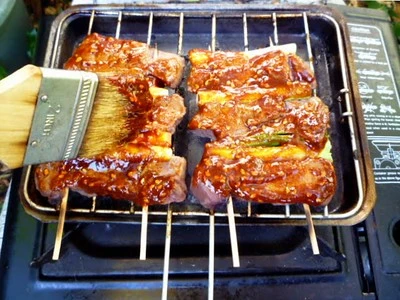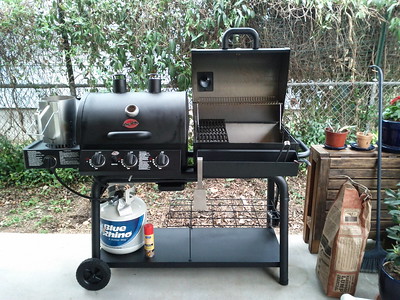
Yes, you can use butane for barbecuing, although it’s more commonly used for indoor cooking appliances and portable stoves. In many countries, propane is more commonly used for outdoor grills due to its higher vapor pressure, making it better suited for outdoor conditions where temperatures can vary. Both butane and propane are liquefied petroleum gases and are closely related; they are flammable hydrocarbons used as fuels.
Here are some points to consider if you’re thinking about using butane for your BBQ:
Advantages of Butane:
- Clean Burning: Like propane, butane burns cleanly and produces only carbon dioxide and water vapor when burned completely.
- Efficient: It offers good fuel efficiency and can be less expensive in some markets.
Disadvantages of Butane:
- Low Vapor Pressure: Butane has a lower vapor pressure compared to propane, making it less effective in cold weather. If you’re planning to barbecue in colder temperatures, propane may be a better choice.
- Availability: Propane is more commonly used for outdoor cooking in many places, so accessories and refill options may be more limited for butane.
Safety Considerations:
- Proper Equipment: Make sure your BBQ is designed to run on butane or is convertible between propane and butane. Using the wrong gas can be dangerous.
- Ventilation: Make sure you’re cooking in a well-ventilated area to allow combustion byproducts to disperse.
- Check Connections: Always check hose connections and seals to ensure they are secure and in good condition to prevent gas leaks.
Before deciding to use butane for your BBQ, make sure to read the manufacturer’s guidelines for your grill and consult local regulations, as some areas may have restrictions on the types of gas you can use for outdoor cooking.
Read related article: Can You Use Butane Indoors?
Advantages of Using Butane for BBQ
A. Clean Burning
One of the significant advantages of using butane as a fuel for BBQ is its clean-burning properties. When combusted, butane produces minimal pollutants, primarily emitting carbon dioxide and water vapor. Unlike charcoal, which can produce harmful substances like soot and volatile organic compounds (VOCs), butane offers a cleaner alternative. This cleaner burning not only makes it a more environmentally friendly option but also leads to fewer residues on your cooking equipment, thereby making cleanup easier.
B. Fuel Efficiency
Butane is also highly fuel-efficient, meaning you get more cooking time per unit of fuel compared to some other options. Its high energy density allows for consistent heating, making it ideal for cooking foods evenly. Moreover, the burners designed for butane often feature more efficient combustion systems, further enhancing fuel efficiency. This can be particularly beneficial for long BBQ sessions or when cooking large amounts of food.
C. Cost-Effectiveness
In terms of cost per unit, butane can be less expensive than propane in some markets, making it a cost-effective choice for your BBQ needs. The efficiency of butane also means that you may need to refill or replace canisters less often, thereby saving money in the long run. Additionally, butane canisters are often available in smaller sizes, which may offer a more affordable upfront cost compared to the larger propane tanks, making it a budget-friendly option for occasional grillers or those with limited storage space.
Butane offers several advantages, including clean burning, fuel efficiency, and cost-effectiveness, making it a viable option for your BBQ cooking needs. However, it’s crucial to weigh these benefits against the disadvantages and safety considerations to make an informed decision.
Read also: Where Should You Store Butane Canisters at Home?
Disadvantages of Using Butane for BBQ
A. Low Vapor Pressure
One of the main drawbacks of using butane for BBQ is its low vapor pressure compared to propane. This characteristic can impact its performance, particularly in colder weather conditions. Because butane has a lower boiling point, it may not vaporize as effectively in colder temperatures, affecting the efficiency and reliability of the BBQ grill.
This could lead to uneven cooking or, in extreme cases, a lack of sufficient heat to cook your food properly. For those living in areas with cooler climates or planning to barbecue during colder months, propane may be a more reliable choice due to its higher vapor pressure and better performance in a wider range of temperatures.
B. Availability
Another disadvantage of using butane for BBQ is the issue of availability. Propane is more widely used for outdoor cooking in many parts of the world, which means that accessories and refills are often easier to find.
While butane canisters are commonly used for indoor portable stoves and lighters, they may not be as readily available in larger quantities suitable for BBQ. Furthermore, most BBQ grills are designed to work with propane, so if you are interested in using butane, you may have to invest in converters or adapters, adding to the overall cost and complexity. Some areas may also have limited retailers that stock butane, making it inconvenient to obtain refills.
While butane has several advantages that make it an attractive option for BBQ, its disadvantages, including low vapor pressure and limited availability, should not be overlooked. These factors could impact the convenience and reliability of your BBQ experience, making it essential to consider them when choosing your fuel type.
Propane vs Butane – Which Is Right For Your BBQ?
When it comes to choosing the right fuel for your BBQ, the most common options are propane and butane. Both are liquefied petroleum gases, and at first glance, they may seem quite similar. However, there are key differences that can significantly impact your grilling experience. In this article, we’ll explore the pros and cons of each to help you make an informed decision.
Advantages of Propane
- Higher Vapor Pressure: Propane’s higher vapor pressure makes it more suitable for a range of outdoor temperatures, providing consistent performance even in colder weather.
- Widespread Availability: Propane is more commonly used for outdoor grilling, making it easier to find tanks, accessories, and refills.
- Quick Heating: Propane generally heats up quickly, providing a fast and efficient cooking experience.
Advantages of Butane
- Clean Burning: Like propane, butane burns cleanly, emitting primarily carbon dioxide and water vapor, which means fewer pollutants.
- Fuel Efficiency: Butane offers good fuel efficiency, often providing more cooking time per unit compared to propane.
- Cost-Effectiveness: Depending on the market, butane can be less expensive per unit, making it a budget-friendly option for some grillers.
Disadvantages of Propane
- Cost: Propane can be more expensive per unit in some markets, and the tanks are often larger, requiring a bigger upfront investment.
- Storage: Larger propane tanks may take up more space, making them less ideal for small outdoor areas or for those who prefer portable options.
Disadvantages of Butane
- Low Vapor Pressure: The lower vapor pressure means butane can struggle in colder temperatures, potentially affecting your BBQ’s performance.
- Limited Availability: It may be harder to find butane accessories and refills, particularly for outdoor grilling.
Safety Considerations for Both Fuels
- Proper Equipment: Ensure your BBQ is designed for the type of gas you’re using or is convertible between propane and butane.
- Ventilation: Always cook in a well-ventilated area to allow combustion byproducts to disperse.
- Check Connections: Before lighting up, always check hose connections and seals to prevent gas leaks.
Conclusion
You can use butane for BBQ, but it comes with its own set of pros and cons. While butane is clean-burning and can be cost-effective, its lower vapor pressure makes it less ideal for cold-weather grilling. Additionally, it’s less commonly used for outdoor BBQs, so finding refills and accessories might be more challenging.
Safety should always be a priority, so ensure your grill is compatible with butane and always cook in a well-ventilated area. Ultimately, the best choice of fuel for your BBQ will depend on your specific needs and local conditions.
Before making a final decision, it’s advisable to read your grill’s manufacturer guidelines and check local regulations concerning fuel types for outdoor cooking. Your choice should factor in not just cost and efficiency, but also convenience and safety.

Mike is an experienced propane technician with over 15 years of professional experience in the field. He has dedicated his career to helping customers with their propane needs, from installation to maintenance and repair. Together with Jeremy, he co-founded this website to provide useful information and guidance to customers seeking reliable propane services.



